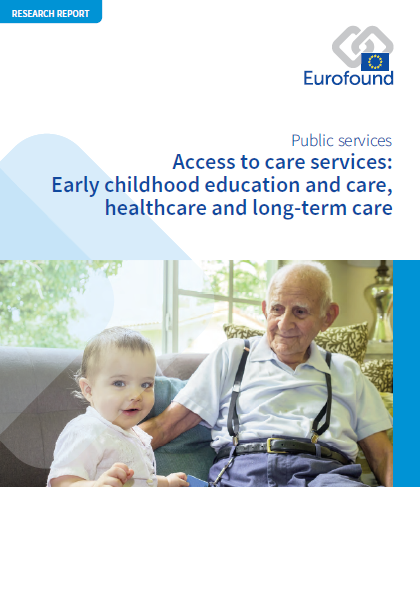
Euroopan sosiaalisten oikeuksien pilarissa korostetaan oikeutta laadukkaisiin hoitopalveluihin. Tässä raportissa keskitytään kolmeen hoitotoiminnan muotoon: varhaiskasvatukseen, terveydenhuoltoon ja pitkäaikaishoitoon. On osoitettu, että näiden palvelujen saatavuudella autetaan vähentämään epätasa-arvoa kaikissa elinkaaren vaiheissa ja edistetään naisten ja vammaisten henkilöiden tasa-arvon saavuttamista. Raportissa hyödynnetään Eurofoundin yhteyshenkilöiden verkostolta saatuja tietoja ja Eurofoundin omaa tutkimusta. Siinä tehdään yleiskatsaus nykyiseen tilanteeseen EU:n eri jäsenvaltioissa, Norjassa ja Yhdistyneessä kuningaskunnassa sekä käsitellään palvelujen käytön esteitä ja eroja niiden saatavuuden kannalta eri väestöryhmien välillä EU:ssa. Siinä keskitytään erityisesti kolmeen alueeseen, joilla palvelujen saatavuutta voidaan parantaa: vammaisten ja erityisopetusta tarvitsevien lasten varhaiskasvatukseen, sähköiseen terveydenhuoltoon ja tilapäishoitoon.
Key findings
On tarkasteltava ongelmia, ei vain täyttämättömiä tarpeita. Ihmiset saattavat saada hoitotarpeensa täytetyksi, mutta kokevat hankaluuksia prosessin eri vaiheissa.
Hinta on suurin este, mutta sen aiheuttamaa ongelmaa ei ratkaista hoitokustannusten vähentämisellä, jos kotitalouden tuloja ja menoja ei oteta laajemmin huomioon.
Jotta oikeus hoidon saamiseen voidaan todella toteuttaa, on tärkeää keskittyä ongelmien syiden moninaisiin ulottuvuuksiin koko prosessin laajuudelta tarpeiden määrittämisestä ja niiden täyttämisestä kotitalouksiin, rakenteisiin ja yhteiskuntaan liittyviin tekijöihin puuttumiseen asti.
Monet ihmiset eivät käytä varhaiskasvatuksen, terveydenhuollon tai pitkäaikaishoidon palveluja, koska heillä on käytössä epävirallisia hoitojärjestelyjä. He voisivat kuitenkin hyötyä näistä palveluista, jos ne olisivat edullisempia, yksilöllisempiä tai laadukkaampia.
Taloudellisten takaiskujen sietokykyä voidaan lisätä vähentämällä terveydenhuollon saatavuuden riippuvuutta tuloista ja työllisyydestä.
Table 1: Number of respite care recipients, selected countries
Figure 1: ECEC, healthcare and long-term care in the European Pillar of Social Rights
Figure 2: General framework for access to care services
Figure 3: Main reasons for not using professional ECEC, EU27 and the UK, 2018 (%)
Figure 4: Main reasons for not meeting needs for formal ECEC services, EU27 and the UK, 2016 (%)
Figure 5: Level of difficulty in affording ECEC services by income group, EU27 and the UK, 2016 (%)
Figure 6: Proportion of people reporting unmet medical needs and main reason, EU27 and the UK, 2018 (%)
Figure 7: Main reason for unmet medical needs, EU27 and the UK, 2018 (%)
Figure 8: Financial barriers to accessing healthcare: ‘unmet needs’ versus ‘access difficulties’, EU27 and the UK, 2016 (%)
Figure 9a: Unmet needs due to any reason, by employment status, EU27 and the UK, 2010–2018 (%)
Figure 9b: Unmet needs due to affordability, by employment status, EU27 and the UK, 2010–2018 (%)
Figure 10: Proportion of people anticipating difficulties paying for particular types of healthcare, by income quartile and employment status, EU27 and the UK, 2016 (%)
Figure 11: Proportion of people with severe long-standing limitations due to health problems, by age group, EU27 and the UK, 2018 (%)
Figure 12: Use of formal long-term care in previous 12 months by respondent or someone close to them, country groupings, 2016 (%)
Figure 13: Proportion of people aged 65+ with some or severe activity limitations who lack assistance, 2014 (%)
Figure 14: Professional home care: main reason for unmet needs, 2016 (%)
Figure 15: Proportion of people using professional home care services by hours used, EU27 and the UK, 2016 (%)
- Number of pages
-
88
- Reference nº
-
EF20015
- ISBN
-
978-92-897-2108-0
- Catalogue nº
-
TJ-02-20-624-EN-N
- DOI
-
10.2806/7624
- Permalink
Cite this publication
Eurofound (2020), Access to care services: Early childhood education and care, healthcare and long-term care, Publications Office of the European Union, Luxembourg.